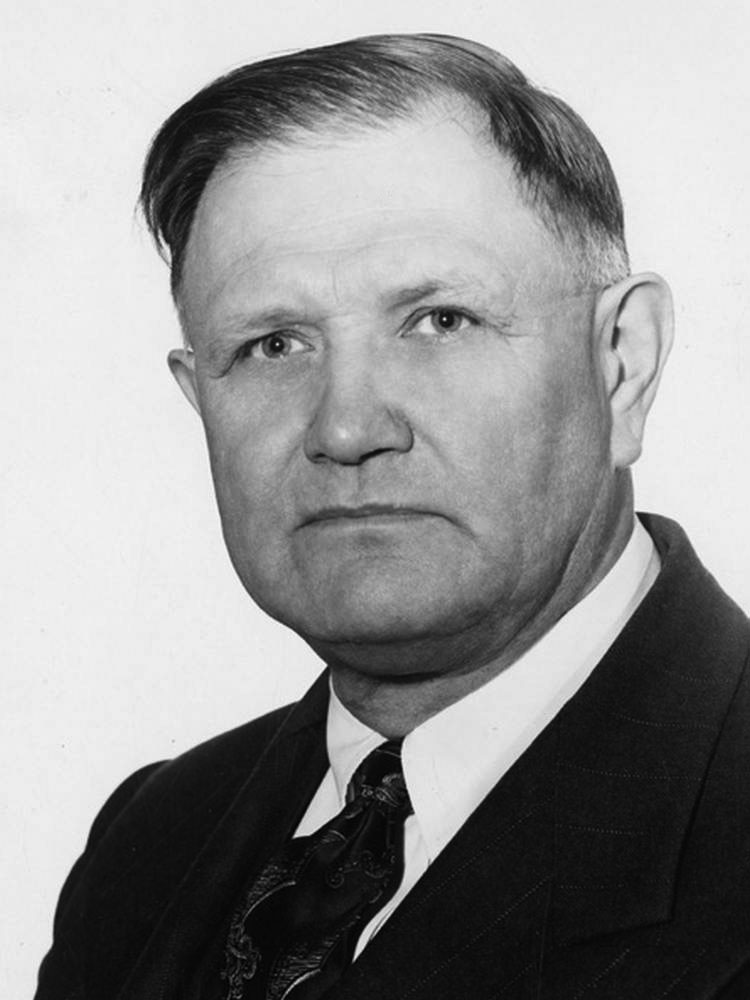Reuben Gustavson

Chancellorship Dates
September 1, 1946 - May 1, 1953
Degrees
- B.A., 1916, University of Denver
- M.A., 1917, University of Denver
- Ph.D., 1925, University of Chicago
Born
April 16, 1892 - Denver, ColoradoDied
February 23, 1974 - Bartlesville, OklahomaInterment
Fairmount Cemetery, Denver, ColoradoSources
Reuben Gustavson, a tall, slightly rumpled veteran of the Manhattan Project and former faculty member and administrator at the Universities of Colorado and Chicago, entered the highest leadership position of the University of Nebraska at a time when the nation and the institution were poised to be re-made. World War II had ended only the year before, and the university was in one of the sharpest transitions in its history. During the war, Nebraska was an instititution starved by the diversion of resources, not to mention students, needed for waging a momentous war. After the war, its fortunes flipped with the massive influx of veterans seeking an education earned in war, through the G.I. Bill, which offered veterans free tuition and living expenses.
Returning veterans were, of course, older in years than college students either before or since. They were worldly-wise, and resistant to the rulemaking of university administrators. So, in addition to the normal expectations of leading a university, and a one-year doubling of enrollment (1945-46) to contend with, Gustavson would have his hands full throughout the remainder of the Forties with an unruly, antiauthoritarian student body. Panty raids, bonfires, and assorted pranks were met by 'Gus' with a guiding touch. Instead of clamping down on the students and the controversy and concern that their behavior caused, Gustavson sought to divert the gaze of the state and the ambitions of the institution toward new knowledge, toward research.
Gustavson saw the administration and faculty as partners on the same mission, and far from the dysfunction that had preceded his administration, brought faculty into policy and strategic decisionmaking. Transparency and openness were Gustavson's calling cards, and he was unashamed to counter prevailing politics with full-throated explorations of sensitive topics. In fact, his first all-university convocation speech, in 1946, was on the topic of "Science and Religion," a minefield of political sensitivities then at least as much as now.
Diversity, though the term was not yet in vogue, was an area of interest for Gustavson. Though the university had backslid considerably from its heady egalitarian roots (for one example of the early climate, an African-American had been elected President of its foremost literary society in 1895, and the fact was not considered remarkable), the University's posture in other areas of racial justice had not carried on the egalitarian ideal. When the first women's dormitories were organized in 1932, they were tacitly segregated. Nebraska's hosting of the Nisei, students of Japanese heritage, brought race again to the fore in 1942. The postwar mood, in which the contributions of all Americans were, if grudgingly, acknowledged, brought bigotry and discrimination to the fore as an issue to be struggled with. Nebraska students had sponsored a conference on racial discrimination in sports in 1947, and in 1948, President Harry Truman banned segregation in the Armed Forces. In 1949, Gustavson led a successful effort to integrate the dormitories and to enact nondiscriminatory policies throughout the university.
Gustavson was an odd fit; a popular liberal in a Republican state, a university head who—it was widely suspected—believed that the football program was properly subordinate to the academic one; one who, at the birth of the Atomic Age, wrote penetrating essays on the solemn responsibilities of atomic stewardship; and a leader who, in the end, may have not had the patience to endure the battles raging in the academic ranks any longer. After an especially heated controversy in the spring of 1953 over the creation of postgraduate masters and doctoral degree programs in education outside the purview of the Graduate College, the widely-respected Gustavson resigned to become the first president of Resources for the Future, a think tank focused on natural resource and environmental issues.
Reuben Gustavson was a deep thinker, a tireless advocate for equality. In the 1958 RFF annual report, he published an essay, "Education and Tomorrow," that laid out the concerns and possible solutions of sustaining affordability for higher education in the United States, an issue with which we still contend today. Gustavson's thoughtful seven years of leadership at Nebraska left the university on a decidedly upward trajectory.